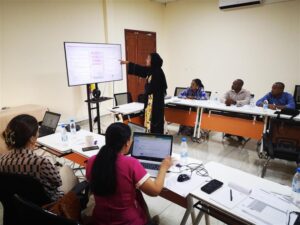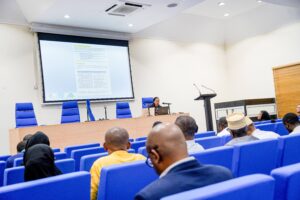The Banque Centrale des Comores (BCC) has officially begun work on the country’s first National Financial Inclusion Strategy (NFIS) as part of an AFI-led training workshop this week. The five-day capacity building event aimed to guide key stakeholders and BCC staff in formulating and implementing an NFIS to drive forward the country’s broader financial inclusion ambitions. By establishing an NFIS, the BCC hopes to increase access to financial services and raise awareness among stakeholders of the pivotal role financial inclusion could play in reinforcing the country’s economic stability and the financial well-being of its people.
The workshop kicked off with the BCC sharing insightful examples of Comoros’ financial inclusion journey. Besides NFIS formulation and implementation, the workshop included sessions specifically dedicated to identifying and engaging stakeholders in NFIS implementation; identifying NFIS target groups; and developing an NFIS governance structure. The event was marked with enriching interactions and knowledge sharing between BCC staff, local stakeholders, and AFI peers – all aimed at supporting BCC in developing a results-driven NFIS with the backing of local public and private sector players.

Attended by key stakeholders including local banks, microfinance institutions, electronic money issuers, telecom operators, development partners, and consumer associations – the NFIS training workshop reflected BCC’s longer-term aspirations to advance inclusive growth in Comoros. In recent years the BCC has embarked on ambitious projects as part of its plan to modernize the country’s payment system – making it safer and more efficient to use.
Currently only “25% of the Comorian population” has a bank account, explained BCC Governor, Dr. Younoussa IMANI who attended the event along with BCC Vice Governor, Faouzia Radjabou. That’s well below the 55 percent regional average, according to the Global Findex Database. Governor IMANI believes that the success of the country’s monetary policy depends heavily on financial inclusion, which is why the BCC decided to make the NFIS a top priority.
“The Central Bank has been an adherent member of AFI since the beginning of 2023. As a result, we benefit from the technical and operational support of the institution. The BCC has made financial inclusion its orientation, its vision for the orientation of the banking sector… For the conduct of its monetary policy”, stressed Governor IMANI in his opening statement.
AFI’s peer learning model also formed a core part of the training with two of its principal members – Madagascar’s Ministry of Economy and Finance and Morocco’s Bank Al-Maghrib – delivering presentations of their own experience in NFIS development and implementation. This provided BCC staff with valuable insights on increasing stakeholder buy-in and ownership – a vital factor in bringing any NFIS to life, explained Ibtissam El Anzaoui, who heads up the Financial Inclusion division at Bank Al-Maghrib. For Morocco’s NFIS “we conducted three workshops to co-construct” the strategy.
“It was essential to share the previously identified NFIS levers with stakeholders to ensure that the outcome was the result of discussions with all the individuals involved in the strategy”, El Anzaoui added.
Financial institution branches in the Comoros have more than doubled in the past 15 years. Microfinance institutions in particular have played an important role in the country’s financial inclusion progress and serve as a major contributor to the Comorian economy¹. However, increased research and investment in digital financial services, mobile money, and interoperability could go a long way in realizing the country’s full financial inclusion potential – especially in rural and semi-rural areas.

Comorians’ reluctance to form part of the formal financial system is what first revealed the need for more advanced financial inclusion initiatives, recalled BCC’s Swabira Saïd, a member of AFI’s Financial Inclusion Strategy Peer Learning Group. This is why the first thing we wanted to do after becoming a member of AFI “was to build the national strategy”.
A solid NFIS can help overcome this consumer reluctance, suggested Tiana Ramparany Ramanarivosoa, who oversees the National Coordination of Microfinance division at Madagascar’s Ministry of Economy and Finance:
“Financial inclusion is the fact of giving the population access to financial services that correspond to their needs, so that it contributes to the economic and social development of the country. That is, financial institutions are reaching out to citizens… The idea is to make it easier for banks to open accounts, [and] for consumers to be comfortable in doing so.”


___________________________________
¹ Comoros | MFW4A – Making Finance Work for Africa

 About
About
 Online
Online
 Data
Data
























